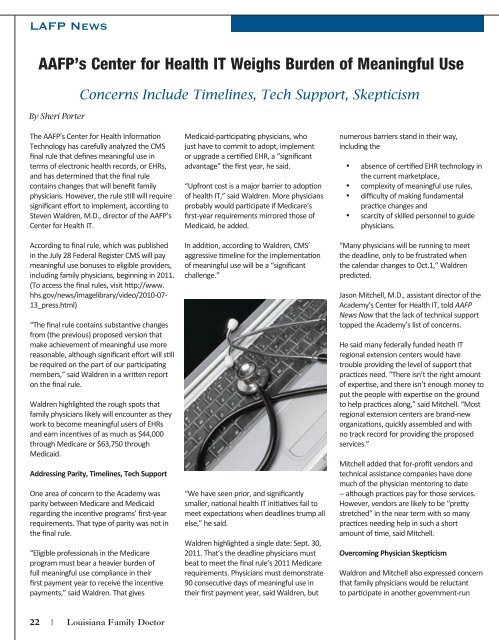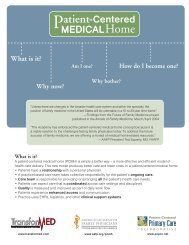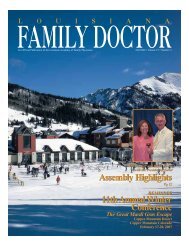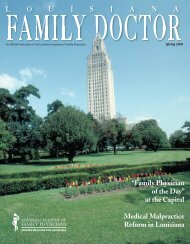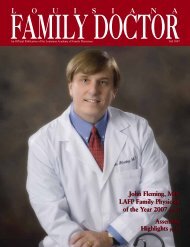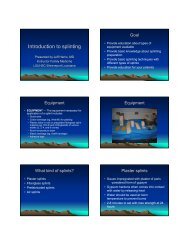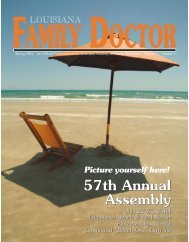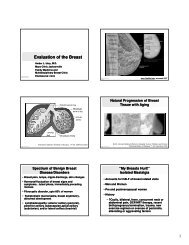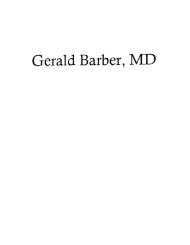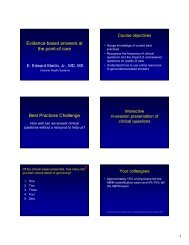What does âMeaningful Useâ Mean? - LAFP
What does âMeaningful Useâ Mean? - LAFP
What does âMeaningful Useâ Mean? - LAFP
- No tags were found...
Create successful ePaper yourself
Turn your PDF publications into a flip-book with our unique Google optimized e-Paper software.
<strong>LAFP</strong> NewsAAFP’s Center for Health IT Weighs Burden of <strong>Mean</strong>ingful UseBy Sheri PorterConcerns Include Timelines, Tech Support, SkepticismThe AAFP’s Center for Health InformationTechnology has carefully analyzed the CMSfinal rule that defines meaningful use interms of electronic health records, or EHRs,and has determined that the final rulecontains changes that will benefit familyphysicians. However, the rule still will requiresignificant effort to implement, according toSteven Waldren, M.D., director of the AAFP’sCenter for Health IT.According to final rule, which was publishedin the July 28 Federal Register CMS will paymeaningful use bonuses to eligible providers,including family physicians, beginning in 2011.(To access the final rules, visit http://www.hhs.gov/news/imagelibrary/video/2010-07-13_press.html)“The final rule contains substantive changesfrom (the previous) proposed version thatmake achievement of meaningful use morereasonable, although significant effort will stillbe required on the part of our participatingmembers,” said Waldren in a written reporton the final rule.Waldren highlighted the rough spots thatfamily physicians likely will encounter as theywork to become meaningful users of EHRsand earn incentives of as much as $44,000through Medicare or $63,750 throughMedicaid.Addressing Parity, Timelines, Tech SupportOne area of concern to the Academy wasparity between Medicare and Medicaidregarding the incentive programs’ first-yearrequirements. That type of parity was not inthe final rule.“Eligible professionals in the Medicareprogram must bear a heavier burden offull meaningful use compliance in theirfirst payment year to receive the incentivepayments,” said Waldren. That givesMedicaid-participating physicians, whojust have to commit to adopt, implementor upgrade a certified EHR, a “significantadvantage” the first year, he said.“Upfront cost is a major barrier to adoptionof health IT,” said Waldren. More physiciansprobably would participate if Medicare’sfirst-year requirements mirrored those ofMedicaid, he added.In addition, according to Waldren, CMS’aggressive timeline for the implementationof meaningful use will be a “significantchallenge.”“We have seen prior, and significantlysmaller, national health IT initiatives fail tomeet expectations when deadlines trump allelse,” he said.Waldren highlighted a single date: Sept. 30,2011. That’s the deadline physicians mustbeat to meet the final rule’s 2011 Medicarerequirements. Physicians must demonstrate90 consecutive days of meaningful use intheir first payment year, said Waldren, butnumerous barriers stand in their way,including the• absence of certified EHR technology inthe current marketplace,• complexity of meaningful use rules,• difficulty of making fundamentalpractice changes and• scarcity of skilled personnel to guidephysicians.“Many physicians will be running to meetthe deadline, only to be frustrated whenthe calendar changes to Oct.1,” Waldrenpredicted.Jason Mitchell, M.D., assistant director of theAcademy’s Center for Health IT, told AAFPNews Now that the lack of technical supporttopped the Academy’s list of concerns.He said many federally funded heath ITregional extension centers would havetrouble providing the level of support thatpractices need. “There isn’t the right amountof expertise, and there isn’t enough money toput the people with expertise on the groundto help practices along,” said Mitchell. “Mostregional extension centers are brand-neworganizations, quickly assembled and withno track record for providing the proposedservices.”Mitchell added that for-profit vendors andtechnical assistance companies have donemuch of the physician mentoring to date-- although practices pay for those services.However, vendors are likely to be “prettystretched” in the near term with so manypractices needing help in such a shortamount of time, said Mitchell.Overcoming Physician SkepticismWaldron and Mitchell also expressed concernthat family physicians would be reluctantto participate in another government-run22 | Louisiana Family Doctor


